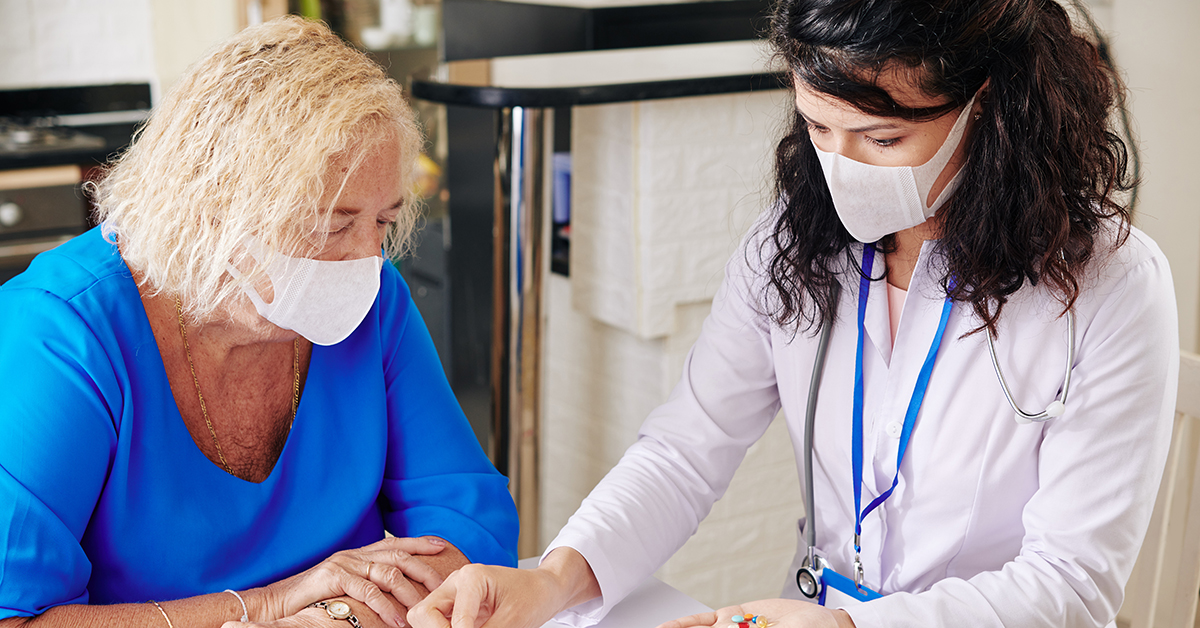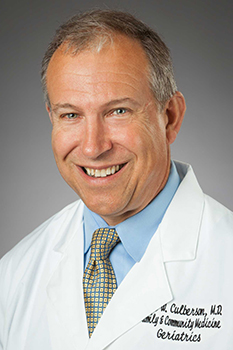
As of January, COVID-19 vaccinations are available in most communities for those who fall under phases 1A and 1B as established by the Texas Department of State Health Services. Since phase 1B prioritizes individuals over 65 (as well as those with certain medical conditions), this means that vaccinations are accessible to older adults.
While some have already taken advantage of this opportunity, there are individuals who are left with questions and hesitations regarding the details of the vaccine and what to expect upon receiving it. John Culberson, M.D., director of clinical geriatric programs at the Garrison Institute on Aging and associate professor of Family and Community Medicine for the Texas Tech University Health Sciences Center (TTUHSC) School of Medicine, acknowledged that while many people might feel anxiety about the vaccine, the complications that come from catching COVID-19 can be quite dangerous for older adults.
“The risk of severe illness or long-term medical effects from a COVID infection is well-known,” said Culberson. “Most doctors recommend that individuals over 65, particularly those with medical problems, get vaccinated.”
What it is and where its offered
Culberson clarified that, while there are several vaccines, the ones that are currently available require receiving two doses approximately three to four weeks apart. Additionally, the vaccine must be kept at very cold temperatures both during shipment and once they arrive at their intended locations.
“The state of Texas has sent a supply of vaccinations to locations that have special storage equipment,” said Culberson. “This has caused challenges to deliver doses to smaller and more rural locations. The number of doses and time of delivery is hard to predict.”
Hospitals and nursing homes received an early allotment of the vaccine, and larger regional sites such as the Lubbock Convention Center provide a stable stream of immunizations. Culberson pointed out that there is a relatively complicated scheduling process surrounding these locations, but that loved ones and health care professionals can be of assistance for those who need it.
“Older adults often have less access to technology and more difficulty making an appointment when a delivery of immunizations is announced,” Culberson said. “Family members can help older loved ones schedule and receive their vaccines, and many clinics at TTUHSC are assisting their patients in making appointments, particularly if they are at high risk.”
Culberson mentioned that most primary care offices are offered scheduling priorities and that pharmacies have vaccines available to the public intermittently. Both can assist older adults throughout this process.
Sites such as the Lubbock Convention Center have planned to administer thousands of vaccinations each day, and while availability might fluctuate, Culberson encouraged persistence.
“There may be temporary area supply shortages,” Culberson said, “If you continue trying, it’s likely that every older adult who wishes to receive the vaccination will be able to do so in the near future.”
The Lubbock Health Department has current information available, and a link to the scheduling site.
“Family members who are familiar with online ticket purchases can often effectively complete scheduling faster than those with less experience,” Culberson suggested. “Patience and perseverance are qualities embraced in our community.”
The importance of vaccinations for an older population
By this point in the pandemic, it is clearly established that the risk for severe illness with COVID-19 increases with age—according to most health care professionals as well as the Centers for Disease Control and Prevention (CDC). This is due to the body’s ability to combat infection.

John Culberson, M.D.
“Fighting off an infection is very complex and requires the body to control a highly coordinated response,” explained Culberson. “Older individuals are more likely to have multiple medical problems, which may lower their response and allow the COVID infection to get worse quickly.”
Culberson added that older adults sometimes have a less-controlled, overactive response to COVID. While not all individuals have this response, the safest choice is for those over 65 to get vaccinated as soon as possible.
Even for those who have already been infected with COVID-19, Culberson said it is safe and encouraged to receive the vaccine.
“Nobody knows how long you are protected from another COVID infection, so an immunization may protect older adults longer or better,” said Culberson. “It is suggested to wait 90 days after recovering from COVID before being immunized. You are unlikely to be re-infected during that time and may have a moderate, but not serious, reaction to the vaccine—since your body remembers what COVID looks like.”
Receiving the second dose is also crucial to the currently available vaccines. Upon getting the first shot, sites will provide an appointment for individuals to receive a second one in three to four weeks. Culberson explained that it is not vital that you get your second vaccine exactly three to four weeks after the first one, but following directions as closely as possible will provide the best protection.
What to expect from your vaccination appointment
Upon arrival at your appointment for one of the available vaccines, Culberson advised that patients should expect that all locations will adhere to social distancing and mask precautions in order to ensure optimal safety.
“Once identification is checked and forms are signed, individuals move quickly to a chair where a volunteer will administer an immunization in the upper arm,” said Culberson, adding that there are volunteers available to assist patients throughout the process. He also mentioned that you will be required to social distance in a waiting area for 15 minutes after immunization.
“Nurses and medical personnel will be present to help you if you feel bad,” said Culberson, who noted that very few individuals require any assistance during this waiting period.
Culberson clarified that, later that day, the presence of certain symptoms post-vaccination are considered normal—particularly after the second vaccine.
“You may have symptoms such as fatigue, headache or body ache. Sometimes individuals even get a slight fever,” said Culberson. “If your health care professional approves you to take Tylenol or Ibuprofen, this can help, although symptoms almost never last more than six to 12 hours and are often very mild.”
The immunization center will give you a card with information about the vaccine you received as well as when you should receive a second vaccine, if necessary.
For those wondering about the lasting nature of immunity, Culberson says at this time it is unknown whether patients will need to be revaccinated in the future.
“We learn more about COVID every day,” assured Culberson. “Many people are working very hard to protect you and your family.”
